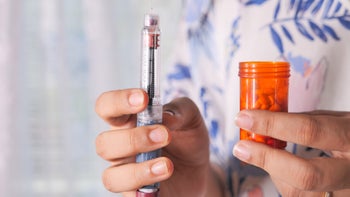
Levemir
Levemir (insulin detemir) is a long-acting insulin that helps control high blood sugar levels in children and adults. It's injected under the skin, typically once or twice daily. Like all insulins, Levemir (insulin detemir) can raise your risk for low blood sugar, so make sure to keep fast-acting sugars with you in case your blood sugar level drops too low. This medication comes in vials. But it's also available as a Flexpen for people who have trouble drawing up insulin from the vial.

What is Levemir (insulin detemir)?
What is Levemir (insulin detemir) used for?
How Levemir (insulin detemir) works
Levemir (insulin detemir) is an insulin, which is a hormone that helps lower glucose (sugar) levels in the blood. It's a long-acting insulin, which means it can help lower your blood sugar levels for up to a 24-hour period.
Drug Facts
More on Levemir (insulin detemir) essentials

Get your GoodRx coupon

What are the side effects of Levemir (insulin detemir)?
Common Side Effects
- Shakiness, hunger, and other symptoms of low blood sugar (up to 93%, depending on what other blood sugar medications you're taking)
- Common cold involving the nose, throat, and lungs (up to 27%)
- Headache (up to 23%)
- Pain or irritation of the throat (10%)
- Back pain (8%)
- Fever, chills, and other flu-like symptoms (up to 8%)
- Stomach pain (6%)
Other Side Effects
- Weight gain
- Swelling (from fluids) in the hands or feet
- Redness, pain, itching, and other symptoms of injection site reactions
Serious Side Effects
- Dangerously low blood sugar (severe hypoglycemia): feeling shaky, being nervous or anxious, fast heartbeat, sweating or body chills, confusion, feeling sleepy, weakness or low energy and excessive hunger
- Serious allergic reactions: hives, itching, swelling of face or tongue, difficulty breathing
- Dangerously low levels of potassium (hypokalemia): muscle twitches, muscle cramps, abnormal heart rhythms, fatigue
Source: DailyMed
More on Levemir (insulin detemir) side effects
The following side effects have also been reported
Along with its needed effects, a medicine may cause some unwanted effects. Although not all of these side effects may occur, if they do occur they may need medical attention.
Check with your doctor immediately if any of the following side effects occur:
Incidence not known
blurred vision
chills
cold sweats
confusion
cool, pale skin
difficulty swallowing
dizziness
fast heartbeat
headache
hoarseness
increased hunger
irritation
joint pain
nightmares
puffiness or swelling of the eyelids or around the eyes, face, lips, or tongue
redness of the skin
seizures
shakiness
slurred speech
stiffness or swelling
swelling of the eyelids, face, lips, hands, or feet
tightness in the chest
trouble breathing
unusual tiredness or weakness
Some side effects may occur that usually do not need medical attention. These side effects may go away during treatment as your body adjusts to the medicine. Also, your health care professional may be able to tell you about ways to prevent or reduce some of these side effects. Check with your health care professional if any of the following side effects continue or are bothersome or if you have any questions about them:
Incidence not known
Bleeding, blistering, burning, coldness, discoloration of the skin, feeling of pressure, hives, infection, inflammation, itching, lumps, numbness, pain, rash, redness, scarring, soreness, stinging, swelling, tenderness, tingling, ulceration, or warmth at the injection site
decrease in the amount of urine
noisy, rattling breathing
redistribution or accumulation of body fat
swelling of the fingers, hands, feet, or lower legs
trouble breathing at rest
Other side effects not listed may also occur in some patients. If you notice any other effects, check with your healthcare professional.
Call your doctor for medical advice about side effects. You may report side effects to the FDA at 1-800-FDA-1088.

Pros and cons of Levemir (insulin detemir)

Pros
Lower risk of weight gain compared to some other types of insulin
Doses can be adjusted to meet your body's needs
Insulin pens available for people who've trouble using insulin vials
Provides blood sugar control for up to 24 hours

Cons
Must be injected
Might need to inject it twice daily
Can cause low blood sugar
No generic option available

Pharmacist tips for Levemir (insulin detemir)

For proper storage, unopened pens and vials should be kept in the fridge until the expiration date on the box, or at room temperature for up to 42 days. Once opened, pens should be kept at room temperature (not refrigerated) for up to 42 days, and vials can be kept in the fridge or at room temperature for up to 42 days.
If you've been using the Levemir (insulin detemir) Flextouch pen, let your provider know. The manufacturer has discontinued the Levemir (insulin detemir) Flextouch pen in February 2023, so you might have a hard time finding it at a pharmacy. The manufacturer released another pen in its place called the Levemir (insulin detemir) FlexPen. You might need to ask your provider for another prescription in order to receive the Levemir (insulin detemir) FlexPen.
Your provider will train you on how to give yourself Levemir (insulin detemir) correctly. Make sure to inject Levemir (insulin detemir) at the same time each day, but rotate injection sites to prevent skin irritation, lumps, pits, or thickened skin.
You can inject Levemir (insulin detemir) under your skin in your upper arm, abdomen (stomach area), or thigh (upper leg). Never inject it into a vein or muscle. Check out this step-by-step video on how to use the pen.
If you noticed areas of thickened skin from repeated Levemir (insulin detemir) injections, choose a different area for future injections. Injecting into areas with thickened skin will cause the insulin to not work as well and put you at risk for high blood sugar.
Don't dilute or mix Levemir (insulin detemir) with other types of insulin; it won't work as intended and you may lose blood sugar control, which could be serious.
Keep a consistent meal and exercise schedule to prevent any fluctuations (rises and falls) in your blood sugar.
Don't reuse insulin needles. Always use a new needle for each Levemir (insulin detemir) injection. Reusing needles raises your chance of having blocked needles, which can cause you to get the wrong dose of Levemir (insulin detemir). Using a new needle for each injection also lowers your risk of getting an infection.
When changing to Levemir (insulin detemir) from other long-acting insulins, you might experience higher average fasting blood sugar levels during the first weeks of therapy. Check and record your blood sugar levels daily to make sure that they're within a healthy range. Let your provider know what your blood sugar numbers are so they can make adjustments to your Levemir (insulin detemir) dose, if needed.
Levemir (insulin detemir) can put you at risk for low blood sugar and cause symptoms such as dizziness, feeling weak, and shakiness. If your blood sugar level drops too low, then it's important that you eat 15 grams of fast-acting sugar to bring your blood sugar level back to a safe range. After eating 15 grams of fast-acting sugar, wait 15 minutes and recheck your blood sugar level. If it's still too low, then call 911 and eat another 15 grams of carbohydrates while you wait for help to arrive. Recheck your blood sugar again in 15 minutes.

Frequently asked questions about Levemir (insulin detemir)

How to save using GoodRx




What are the risks and warnings for Levemir (insulin detemir)?
Levemir (insulin detemir) can cause some serious health issues. This risk may be even higher for certain groups. If this worries you, talk to your doctor or pharmacist about other options.

Infections
Never share Levemir (insulin detemir) pens, syringes, or needles with anyone else. Sharing Levemir (insulin detemir) with someone puts you at risk of getting serious infections.

Low blood sugar
Risk factors: Changes in diet and exercise | Drinking alcohol | Taking other blood sugar medications | Over age 65 | Liver or kidney problems
The most common side effect of insulin, including Levemir (insulin detemir), is low blood sugar. Very low blood sugar can be life-threatening. Make sure you know how to recognize symptoms of low blood sugar, include feeling shaky, being nervous or anxious, confusion, or hunger. If you experience any of these symptoms, check your blood sugar level. Keep glucose tablets or other fast-acting sugars on you so that you're prepared to treat your low blood sugar. Follow the "15-15 Rule" to bring your blood sugar back to a safe level. Talk to your doctor or pharmacist if you experience frequent low blood sugar episodes while taking Levemir (insulin detemir) because they might need to adjust your insulin dose.

Severe allergic reactions
In some rare cases, Levemir (insulin detemir) can cause severe allergic reactions that can be life-threatening. Go to the emergency room right away if you suddenly have problems breathing, a fast heartbeat, or if you feel your face, mouth, or throat swell up.

Low blood potassium levels
Risk factors: Taking medications that can lower potassium levels
Levemir (insulin detemir) can lower levels of potassium in your blood, which can be dangerous. You're more at risk if you're already taking medications that lower your potassium. Your doctor will check your potassium levels regularly and might give you medications to keep your potassium normal. Let your provider know right away if you experience symptoms of low blood potassium levels, such as muscle weakness, tiredness, fast heartbeat, and a tingling sensation in your hands, legs, or feet.

Swelling from fluids and risk of heart failure
Risk factors: Taking a class of blood sugar medication called thiazolidinediones | Heart failure
If you're also taking a thiazolidinediones (TZD) blood sugar medication, let your provider know before you start Levemir (insulin detemir). Combining TZD with insulin can lead to swelling from fluids. This can worsen or lead to heart failure. Let your provider know if you noticed that you suddenly gained a lot of weight or if you have symptoms of heart failure, such as as trouble breathing, tiredness, headache. Your provider might need to make changes to your blood sugar medications.

Levemir (insulin detemir) dosage forms
Typical dosing for Levemir (insulin detemir)
Type 1 diabetes: Your healthcare provider will help you calculate your total daily insulin (TDI) requirement based on your body weight. The typical starting dose ranges from about 30% to 50% of your TDI requirement, injected under the skin. It's injected either once daily in the evening, or split up into two doses and injected twice daily in the morning and evening.
Type 2 diabetes: The typical starting dose is 10 units (or 0.1 units/kg to 0.2 units/kg of body weight) injected under the skin. It's injected either once daily in the evening, or split up into two doses and injected twice daily in the morning and evening.
If you're switching from another type of insulin, your provider will determine your new Levemir (insulin detemir) dose based on the type of insulin you're switching from.
More on Levemir (insulin detemir) dosage forms

Interactions between Levemir (insulin detemir) and other drugs
More on Levemir (insulin detemir) interactions
Using this medicine with any of the following medicines is usually not recommended, but may be required in some cases. If both medicines are prescribed together, your doctor may change the dose or how often you use one or both of the medicines.
- Balofloxacin
- Besifloxacin
- Chloroquine
- Ciprofloxacin
- Enoxacin
- Fleroxacin
- Flumequine
- Gatifloxacin
- Gemifloxacin
- Hydroxychloroquine
- Lanreotide
- Levofloxacin
- Liraglutide
- Lomefloxacin
- Macimorelin
- Metoclopramide
- Metreleptin
- Moxifloxacin
- Nadifloxacin
- Norfloxacin
- Octreotide
- Ofloxacin
- Pasireotide
- Pazufloxacin
- Pefloxacin
- Pioglitazone
- Pramlintide
- Prulifloxacin
- Rosiglitazone
- Rufloxacin
- Sparfloxacin
- Thioctic Acid
- Tosufloxacin
Using this medicine with any of the following medicines may cause an increased risk of certain side effects, but using both drugs may be the best treatment for you. If both medicines are prescribed together, your doctor may change the dose or how often you use one or both of the medicines.
- Acebutolol
- Albiglutide
- Atenolol
- Betaxolol
- Bisoprolol
- Carteolol
- Carvedilol
- Celiprolol
- Dulaglutide
- Esmolol
- Exenatide
- Furazolidone
- Iproniazid
- Isocarboxazid
- Labetalol
- Levobunolol
- Linezolid
- Lixisenatide
- Methylene Blue
- Metipranolol
- Metoprolol
- Moclobemide
- Nadolol
- Nebivolol
- Nialamide
- Oxprenolol
- Penbutolol
- Phenelzine
- Pindolol
- Practolol
- Procarbazine
- Propranolol
- Rasagiline
- Safinamide
- Saxagliptin
- Selegiline
- Sotalol
- Timolol
- Tranylcypromine

How much does Levemir (insulin detemir) cost?

Levemir (insulin detemir) contraindications
Low blood sugars that aren't treated

What are alternatives to Levemir (insulin detemir)?

What is the latest news about Levemir (insulin detemir)?
Get savings updates for Levemir (insulin detemir)
Receive price alerts, news, and other messages from GoodRx about Levemir (insulin detemir) and other healthcare topics and relevant savings offers.By signing up, I agree to GoodRx's Terms and Privacy Policy, and to receive marketing messages from GoodRx.
References
Best studies we foundAmerican Diabetes Association. (n.d.). Hypoglycemia (Low Blood Glucose).
Arnold, S. V., et al. (2019). Understanding Contemporary Use of Thiazolidinediones An Analysis From the Diabetes Collaborative Registry. Circulation: Heart Failure.
Association of Diabetes Care & Education Specialties. (2019). Managing Low Blood Sugar.
GuidelineCentral. (2024). Diabetes standards of care 2024.
Mehta, R., et al. (2021). Practical guidance on the initiation, titration, and switching of basal insulins: a narrative review for primary care. Annals of Medicine.
Novo Nordisk. (2022). LEVEMIR- insulin detemir injection, solution [package insert]. DailyMed.
Novo Nordisk. (n.d.). What is Levemir?
Compare other Diabetes Type 2, Diabetes Type 1 drugs
Browse medications
View AllResearch prescriptions and over-the-counter medications from A to Z, compare drug prices, and start saving.




















